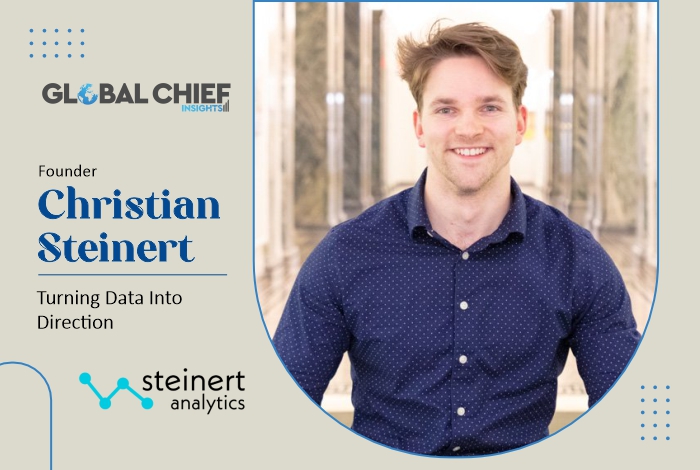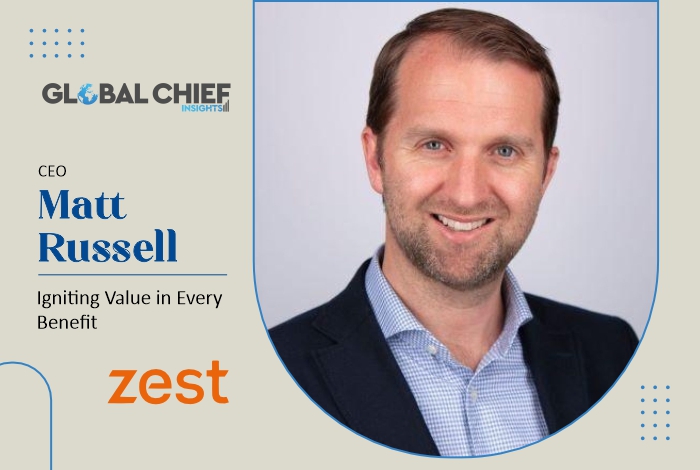Steinert Analytics: Turning Data Into Direction


How Christian Steinert helps businesses turn messy numbers into clear moves!
Christian Steinert knows what it feels like to stare at data that does not move the needle. His firm, Steinert Analytics, was born in Columbus, Ohio in 2021 to help companies take control of information and use it to guide smart decisions.
Imagine a roofing company watching leads pile up but having no idea what steps convert them into paying customers. That was the problem. Christian stepped in, brought stakeholders together across sales, finance, and marketing, and mapped out the real journey of a customer. Suddenly the chaos became clarity.
That clarity is what Steinert Analytics delivers, fast. Christian believes waiting for perfect infrastructure is a mistake. Instead he starts by using the data the business already has. Within weeks clients begin to see insights they can act on, building trust from the start.
Steinert Analytics offers a lean approach. The team builds pipelines, makes clean reports, and adds AI where it makes sense. All of this with minimal overhead so the organization can manage things without bloating its headcount.
Christian’s values shape the work. Transparency, communication, and humility guide every project, even when challenges arise. The goal is not dashboards but decisions. When a report does not point to action, he sees it as decoration, not direction.
Near Columbus, mid‑sized healthcare and roofing businesses now rely on Steinert Analytics. They see better marketing performance, smoother sales funnels, and data that’s actually useful. Christian’s approach blends technical skill with human-first collaboration, helping companies move from confusion to confidence.
It is simple. Start small, stay clear, aim for action. That is how Steinert Analytics turns raw numbers into a roadmap businesses can follow.
The Vision Behind Steinert Analytics
Christian Steinert founded Steinert Analytics in 2021 with a clear aim: help organizations extract value from raw data and convert those insights into profit-driving decisions. Working primarily with SaaS startups and B2B companies in Central Ohio, his firm provides full-stack data platforms, from pipelines to dashboards and AI automation, built to accelerate ROI while containing costs.
What this really means is Steinert focuses on actionable intelligence, not just flashy visualizations. The firm’s strength lies in bridging the gap between data collection and decision-making. They use Keboola Connection to streamline data flows, enabling clean, high-quality datasets to reach BI tools like Looker or Looker Studio quickly. This strategy gives companies real-time insight into sales, marketing spend, customer behavior, and operational efficiency.
Clients praise Steinert Analytics as a strategic partner, not just a vendor. The team emphasizes transparency, egoless communication, and continuous learning. While technical delivery is important, the more significant impact comes from honest, aligned consulting that supports sustainable transformation. That combination of smart technology choice, speed, and principled communication quickly set Steinert apart in Central Ohio’s tech landscape.
Christian often describes analytics as a revenue engine and waste cutter. His perspective is that data systems should not hide complexity. They should clarify and empower. That vision underpins every engagement: strategy alignment, streamlined pipelines, AI-driven automation, and dashboards that deliver insight, not just numbers.
Strategy Alignment and Roadmap: Laying the Foundations
Before diving into tools or dashboards, Steinert Analytics begins with aligning data strategy to the company’s business goals. That means working with leadership to define objectives and figure out key performance indicators (KPIs) that matter for growth or cost-efficiency. With that, Christian and his team design data architecture and a roadmap tailor made for each company’s needs.
Rather than launching into full platform builds, Steinert prefers modular modernization: focus on the “quick wins” that deliver value fast. Maybe it is improving lead tracking in a SaaS funnel, or automating email reporting in HubSpot or Salesforce. The goal is always to deliver clarity and insight, not infrastructure for its own sake. That mindset helps teams see progress early and builds trust as the system scales.
Christian often says that data strategy alignment turns data from a byproduct into a planned asset. It is not about collecting everything. It is about choosing what matters and rigorously building for that. When companies begin with purpose rather than technology, they make smarter decisions about architecture, staffing, and tools. It is sustainable modernization, not over-engineering.
One key element: stakeholder inclusion. Strategy sessions involve not just data teams but sales, digital, finance, and anyone who interacts with data. That alignment keeps change from being top-down and ensures cross-functional clarity and accountability.
Building the Data Backbone: Pipelines and Infrastructure
Once the strategy is clear, Steinert Analytics builds the infrastructure to support it. The team relies on Keboola Connection, a low-cost platform that supports smooth data ingestion and transformation. They pull together data from CRMs, marketing stacks, EHRs (for healthcare clients), Google Analytics, and internal systems to construct a unified, high-quality dataset.
Christian’s philosophy is that your existing staff should manage the system, not rely on external engineers. That means minimal overhead. One or two well-trained internal team members can handle everything after handoff. Documentation and training are included to ensure continuity and confidence as the client takes control.
Steinert also insists on pragmatism. Do not rebuild everything. Identify stable data sources and expand from them. Avoid introducing tools that your team does not already know or cannot manage. SQL and Power BI might serve better than introducing Spark or Airflow in some cases. The goal is scalability with sustainability.
This approach supports rapid time to market, meaning insights arrive quickly, and maintains cost discipline. It avoids one of Christian’s pet peeves: over-engineered data stacks that become brittle and expensive. Instead, his clients receive a durable infrastructure built around business value.
Clear Reporting and Actionable Dashboards
Steinert Analytics does not just hand over dashboards. They build tools with clear business cases in mind. Each dashboard answers a specific question. For example: which marketing channel delivers the best pipeline ROI? Where are customer support costing the most? What trends drive subscription churn? Metrics have to tie to decisions.
Dashboards also incorporate transparency. Definitions, SQL logic, sources, these are not hidden. That fosters trust and self-service by business users, not just technical users. It eliminates skepticism. Stakeholders see where data comes from and understand the logic behind metrics.
Christian regularly warns that dashboards that do not prompt action are decorations. They may look sleek, but if they do not lead to decisions or workflow changes, they are useless. The language he uses is direct: each dashboard supports a decision-maker. What do they need to know, and when? Build around that.
That perspective resonates in reviews. Clients say dashboards feel intuitive, purposeful, and useful, not just data dumps. In sectors like healthcare or SaaS, that clarity often unlocks operational shifts or campaign optimization that deliver immediate ROI.
Data Science and GenAI: Smarter Automation
As clients mature, Steinert introduces AI-driven capabilities. Using Keboola alongside modern BI tools, the firm automates internal workflows such as scheduled reporting, sentiment analysis, or CRM enrichment emails. This frees teams to focus on insight, not execution.
Christian’s approach to generative AI is pragmatic. He uses GenAI where it automates time-consuming processes such as patient relationship workflows in healthcare or prospecting emails in B2B SaaS, and adds prescriptive insights to business questions. Again, the focus is impact, not hype.
GenAI tools are chosen for low-code integration and ease of use. Christian advises clients to avoid tools that obscure logic or create dependencies on external experts. Instead, Steinert builds solutions internal teams can maintain and everyone can trust.
Clients see measurable results: efficiency gains, faster response times, more accurate customer segmentation, and deeper predictive visibility into future opportunities. It closes the loop between data insight and business action, making the data platform not just informative but generative.
Culture Shift: Training, Enablement and Transparency
Delivering tools is not enough. Steinert Analytics embeds a culture of data literacy. They provide tailored training for developers building pipelines and business users interpreting dashboards. That includes documentation of best practices and governance policies, ensuring future-proofing.
This process reduces technical dependency. Rather than return to heavy external support, clients gain autonomy. Steinert emphasizes clear documentation, not just on code but also on why decisions were made. That empowers clients to evolve their systems with confidence.
Christian’s core values, unrivaled transparency, communication, egoless candor, and thirst for continuous learning, are not just branding. They are woven into enablement strategies. Clients often compliment the team’s willingness to take feedback and challenge assumptions.
This supports longer relationships and sustained impact. Rather than build and walk away, Steinert stays involved, making sure systems remain reliable. That persistence turns data investments into lasting advantages.
Real-World Impact
One standout example: Steinert helped a healthcare SaaS startup manage rapid growth after their internal engineer departed. They revamped the company’s data infrastructure, pipeline documentation, ETL flows, dashboard delivery, so new hires could onboard efficiently and scale without disruption. This support was critical to surviving growth waves in 2024.
In another project, Christian helped a roofing company clarify their sales funnel across digital and sales teams. Through a business data modeling workshop that included both teams, they achieved shared definitions across leads, opportunities, and data pipelines. The outcome: better alignment, data quality, and transparency, even before dashboards existed.
Both stories illustrate Christian’s philosophy: start with clarity, not complexity. Data modeling exercises bring people into alignment. That alone delivers value by bringing shared understanding before tools are built. And tools built on that alignment are more effective.
These case studies highlight outcomes: reduced wasted spend, faster team ramp-ups, clearer decision-making, and infrastructure that scales with minimal additional hires. Ultimately, every technology decision rests on business clarity.
What Lies Ahead: Scaling and Industry Focus
Steinert Analytics is a lean team based in Columbus, Ohio, yet the ambition is broader. Christian’s mission is scaling six-figure consulting operations to seven figures without sacrificing values or quality.
Though rooted in Central Ohio, the firm’s focus spans industries: SaaS, healthcare, roofing, fintech, and mid-sized enterprises that need data strategy without expensive infrastructure. Christian describes his clients as MarTech missionaries, companies ready to move toward data-driven revenue clarity.
Looking ahead, Steinert aims to deepen MarTech specializations such as HubSpot, Klaviyo, and Salesforce, all integrated with Keboola and powered by BI automation. The goal is to make high-impact analytics affordable and operable by clients themselves.
His content and thought leadership on LinkedIn, Instagram, and other channels reinforce the message: data problems are often people or process problems in disguise. The best solution is strategic alignment, transparency, and purpose-driven decisions.
In summary, Steinert Analytics is more than a consultancy. It is a partner in transformation. With results like clearer funnels, faster insight, automation, and genuine team empowerment, Christian Steinert is defining a new model for data analytics, one that turns data into profit, clarity, and lasting advantage.



